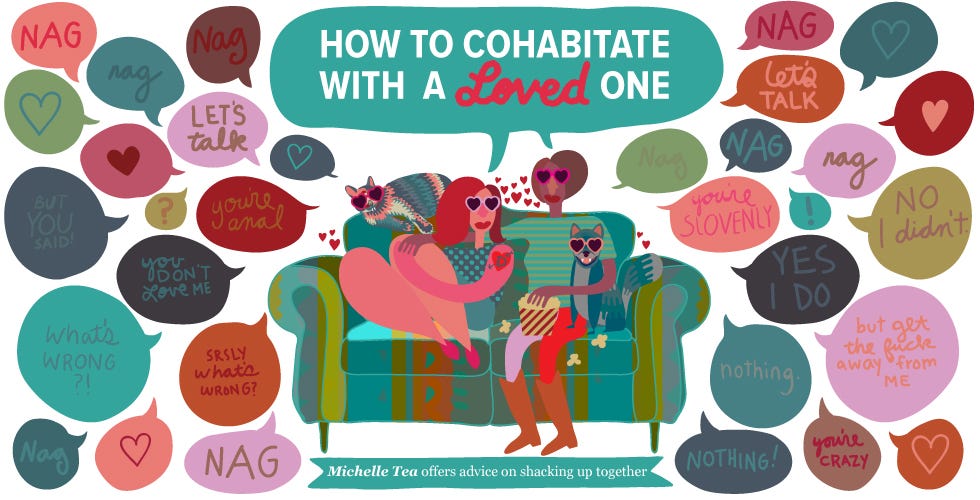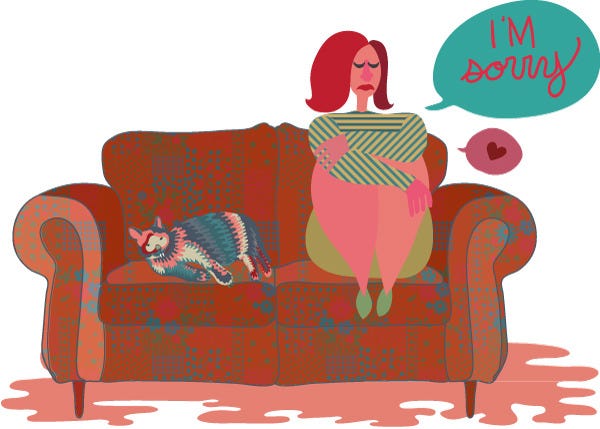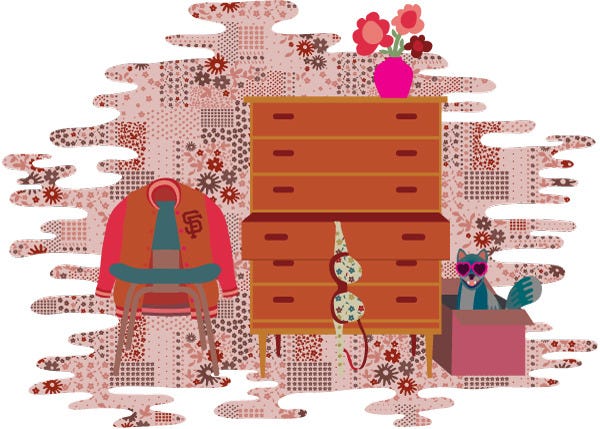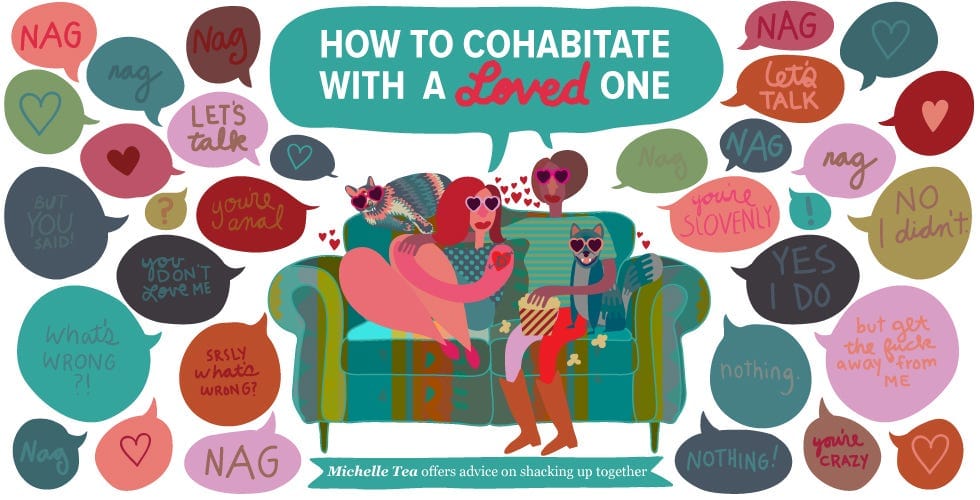
I had sworn I would never again live with a romantic partner, because when you break up it makes things so extra-grisly. Your ex leaves you with their cat, who then blames you for the broken family and bites you whenever you try to sit down on the futon for a cry sesh. Or they bring their mom to help move their stuff out and you have to sit downstairs at the pastry shop eating your feelings and acting like you don’t care. The reasons why not to live with a romantic partner add up as you grow older and become increasingly cynical. But then, if you are me, you meet the love of your dreams and you simply must live together, if for no other reason than to simplify your shared existence. It grows wearisome carrying an extra day’s clothes with you all the time because you never know whose house you’ll be staying at, and the notion of creating a home together is enchanting. So six months ago my beloved Dashiell moved into my apartment, bringing her little dog Charlie along with her.
Have we achieved domestic bliss? Um, not to brag, but we sort of have. We’ve only had two fights, both about nothing, and we end most nights asleep in a hard cuddle on the couch in front of the television, with popcorn in our teeth. Here are some tips for keeping peace in the sheets when you move in with your own true love.


You can’t change people, and there are 12-step programs available if this is a concept especially hard for you to grasp. Dashiell and I live differently, as any two people will. I don’t want to call her style of life “anal” because it sounds judgmental, and she would probably restrain herself from calling my mode “slovenly” for the same reason. But let’s just say that Dashiell is the kind of person who, when entering our shared bedroom and noticing I’ve left three out of six drawers sort of open, with bits of clothing hanging out, goes over and nudges them shut. She does not sigh passive-aggressively when she does this, so that I then go, “What?” and she goes, “Nothing” and I go, “But wait, you just sighed and closed my underwear drawer, is there something you want to talk about?” and then we get in a fight or at least a long and tedious discussion. Nope. She just shuts the drawers, because they bother her.
There is a saying, and I think it might be Buddhist in origin, which is something like: When you have a problem, you have a problem. Knowing that my darling beloved is sensitive to disorderly spaces and open drawers (an OCD-prone friends calls such things “a hair across my heart”), I do my best to try to keep them closed, with all bra straps tucked neatly inside. But when I forget — and I will, because I am human and/or an Aquarius and the little details can escape me — she doesn’t make a thing about it. She has the problem, and she does something about it. I think this is a good tactic, generally. Like, if you want something done in the house, just do it yourself. It’s faster, it’s easier, there is less disturbance. Of course, you have to be really okay with it and not all resentful.
Truthfully, if Dashiell asked me to please be more mindful about keeping my drawers shut, I’d like to think I’d do it. (Though that time she asked me not to leave the refrigerator door open because she heard on Oprah that your milk can spoil like that, I was so hostile to the request we would have had a fight if Dashiell didn’t just leave the house to get dog food, causing me to sit in the wake of my bad vibes and swiftly apologize.) Oh, there’s another tip — apologize. ASAP. Not only is it the right thing to do, it builds a trust that you’re not crazy, that you are sane and self-reflective and not too proud to own up to your bullshit. And then next time you spew bullshit, your person won’t be all quick to react, because you will have created a precedent for a quick apology turnaround. Get it? Okay, good.
Something about Dashiell just shutting the drawers on her own makes me trust that we can both take care of ourselves in our shared world, and it’s so sweet that I just really want to make an effort to be more thoughtful about such things. You catch more flies with honey, yo.


Gay people have a problem with the word “tolerance” because for years there was a campaign to get straight people not to kill us and to instead “tolerate” us. But tolerance in a queer household is quite a different matter. As Dashiell tolerates my open drawers, so do I tolerate the fact that she still hasn’t unpacked that one box that has been sitting in our living room since August. I tolerate her penchant for draping clothing and jackets over every available chair in our home. I tolerate her need to segregate dirty dish towels from the rest of the laundry by hanging them in an Urban Outfitters bag on the doorknob in the kitchen. I would prefer none of these things to be so, but in the grand scheme of things — who cares? In a 12-step tradition I am part of, people like to say, “Do you want to be right, or do you want to be happy?” Of course chairs are for sitting, not for hanging jeans upon. But do I want to be right, or do I want to be happy? I’m not sitting there anyway. Perspective.


As you live together you will get to know one another’s natures and swings of mood in a deeper way. This is good; it will allow you to note recurring upsets. Such is the case of many female romantic cohabitators, the onset of the monthly menses. When living together, many females get on the same period cycle, which means the same PMS cycle. That funny time each month when Dashiell gets sort of edgy and cold and I get sort of needy and emotional? That’s PMS. It’s really good to recognize it as such, to prevent the same sort of you-don’t-love-me!-yes-I-do-but-get-the-fuck-away-from-me-you’re-crazy! type of argument every 28 days. It is the dreadful point of PMS that its monthly barrage of emotions feels so real, but it’s good practice to remind yourself that they’re not. Ideally, by the onset of menopause you will have mastered this. At least try. Also, you will learn things about your partner such as, no matter how gently you try to wake them when they have fallen asleep in front of the television, they will react like a shell-shocked Vietnam Vet in the throes of an acid flashback. It will take them a moment to understand you are not their enemy. Don’t take it personally. Have compassion for how mentally ill your beloved is, and go to sleep.


The onus for this is especially on the person who is moving their lover into a home you’ve already been living in. Guess what? It is no longer your home. It is your shared home. And if your beloved thinks your collection of mismatched vintage whatever is not collecting, it’s hoarding, you might be wise to listen. When Dashiell moved in I got rid of tons of stuff. I went through each piece of art and décor, asking her if she approved. She did the same. We both had the right to cling to something desperately if it was super meaningful to us. But I think we chose moving in together as a moment to purge much of what we collected before we found each other so that we had the space to bring new things in that we both loved. Of course, it helps to be on the same aesthetic page. I once cohabitated with a partner whose idea of art was a giant painting of a cross-eyed kitten done by someone with a severe disability in 1972. That was hard. It’s great fun to stalk antique stores with Dashiell, picking up quaintly rusted fans from 1955, or moaning in unison about how we always want the most expensive thing in any home interior shop. It can be challenging to hear how unwavering Dashiell’s no can be when I’m fawning over a chipped cow creamer at a flea market. But I understand one of Dashiell’s great strengths is her ability to edit, something I lack, and our house looks sharper when I heed her advice.


Mostly what is important for peaceful cohabitation is giving each other space, especially space to be weird, or drifty, or checked out. The most challenging part of sharing tight quarters with someone can be the pressure to always be on — chipper, connected, energetic, entertaining. But we are all weird animals, and sometimes we’re locked in our heads for no reason. We feel quiet or moody and it’s no one’s fault. I know that, after working at home all day, alone, with my head in the computer, I can be spooky when Dashiell gets home from work. Or, I can be desperate for some companionship while she is exhausted from her day and wants to plop onto the couch and watch that reality show where people from The Real World team up and compete in weird obstacle courses like oiling themselves up and walking a plank to gather armfuls of honey from a bucket on the other side. She loves shit like that. I love paging through fashion magazines like a zombie, barely registering the content, just an endless flash of jewel tones or metallics. Giving each other the space to be authentically in the mood you’re in, without the pressure to fake it for each other, builds trust and love and appreciation and prevents weird fights about nothing. So do it.
These are just a few of what I’ve found works for a serene home life with your beloved. I could go on, but I’ve hit my word count. One last thing — if all else fails, couples counseling rules.







